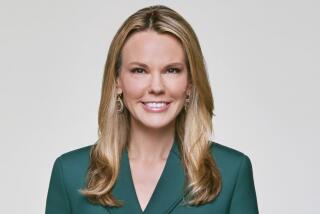Demotion of Chung Debated : Media: Some say she performed poorly in co-anchor post. Others believe gender played a role in the controversy.
- Share via
The failed pairing of CBS anchors Dan Rather and Connie Chung raises a thicket of gender and journalistic questions.
Before Chung was dropped from “The CBS Evening News” in May, TV critics said she performed poorly when anchoring live from hard-news spots like Oklahoma City, and they criticized both her tabloid-style pursuit of skater Tonya Harding and her controversial interview of the mother of House Speaker Newt Gingrich on her newsmagazine “Eye to Eye.”
Within and outside the TV news community the debate continues: Was Chung the most qualified person for the job? Was she judged and treated differently because she is a woman?
In an interview after she was removed as co-anchor, Chung would not call CBS’ treatment of her sexist. But she said, “The fact that I was a woman probably played a part in the way I was treated.”
CBS News president Eric Ober reacted angrily to questions about whether sexism was involved. “If we didn’t get any credit for bringing Connie in as co-anchor two years ago,” he said, “how come it’s a feminist issue when it didn’t work out?”
The reason, some observers say, is that Chung was hired onto the “Evening News” in 1993 more for her high “Q” rating (recognizability and likability among viewers) than for her credentials as a journalist.
“I don’t think she was as qualified as Rather to be an anchor,” said Suzanne Braun Levine, editor of the Columbia Journalism Review, “but there may be some feminist aspects to this. If she was brought in because she’s a woman and fired because she’s a woman, she has a right to be resentful.”
“What’s sexist about this is that CBS made a cynical ratings decision to add Connie because they thought she could bring in younger demographics and soften up Dan’s hard-news image,” said one network executive. “She was not the obvious choice for the job in terms of reporting credentials.”
Chung, 48, who was a White House correspondent for CBS in the early 1970s, was an anchor on Los Angeles station KNXT (now KCBS) for seven years before joining NBC as an occasional anchor. She returned to CBS in 1989, where she had been better known in recent years for her likability among viewers and her celebrity interviews.
Sources say that CBS executives had not exactly worked out the division of labor when they teamed Chung and Rather. CBS ended the partnership amid mounting criticism of Chung’s hard-news anchoring, low ratings for both the newscast and her newsmagazine, and growing tensions between Rather and Chung over assignments.
CBS executives wanted to remove Chung as co-anchor and cancel her newsmagazine, offering her substitute and weekend anchoring and a unit to do prime-time news specials. Chung angered at being asked to accept less than equal status with Rather--told CBS executives she wanted to leave the network.
The night Chung was removed from “The CBS Evening News,” she compared her situation to the 1976 pairing of Barbara Walters and Harry Reasoner on ABC.
Walters told The Times, “Connie’s a very good journalist. But, while the two situations have been compared, there is a very big difference. Harry made it clear from day one--to me and to the executives--that he didn’t want a partner. I believe that Dan had been welcoming and receptive to Connie as co-anchor.”
Chung responded, “I’ve looked at the newspaper clippings, and I believe there are similarities in the intense, microscopic scrutiny and criticism of both Barbara and me.”
Chung won’t talk about her future while she remains in negotiations with CBS to be paid the remainder of her $2-million-plus annual salary.
She said critics had not given her credit for her interview with Chinese leader Li Peng or her coverage of the funeral of President Richard Nixon. “After 26 years in this business,” Chung said, “it’s insulting to have to defend your record as a journalist.”
More to Read
Sign up for Essential California
The most important California stories and recommendations in your inbox every morning.
You may occasionally receive promotional content from the Los Angeles Times.













